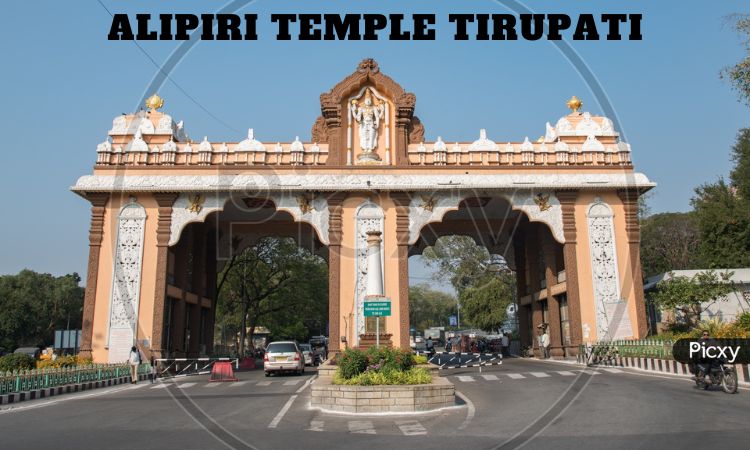
Nestled at the base of the sacred Tirumala Hills in the Chittoor district of Andhra Pradesh, Alipiri Temple Tirupati serves as the gateway to the renowned Tirumala Venkateswara Temple. This ancient and revered site is not only a place of worship but also a symbol of faith, spirituality, and the rich cultural heritage of South India. With its intricate architecture, serene surroundings, and spiritual significance, Alipiri Temple Tirupati attracts millions of devotees and tourists from around the globe.
Alipiri Temple Timings
Alipiri Temple Tirupati operates with specific timings to facilitate the smooth flow of devotees and ensure the sanctity of the rituals. The following are the general timings for the temple:
- Opening Time: The temple opens early in the morning at 4:00 AM. This is the time when the first rituals and prayers begin.
- Closing Time: The temple closes at 10:00 PM after the final rituals of the day.
During festivals and special occasions, the temple timings may be extended to accommodate the influx of devotees and additional rituals.
Historical Significance of Alipiri Temple Tirupati
Alipiri Temple Tirupati holds a deep historical and religious significance. The word “Alipiri” translates to “resting place,” which refers to the location being a resting spot for pilgrims on their way to the Tirumala Temple. Historically, the path from Alipiri to Tirumala was the only route available for devotees to reach the hilltop shrine. This pathway, known as the Alipiri Metlu (steps), comprises 3,550 steps spanning over 11 kilometers, symbolizing the arduous journey undertaken by devotees as an act of penance and devotion.
Architectural Marvels of Alipiri Temple Tirupati
The architecture of Alipiri Temple Tirupati is a testament to the Dravidian style, characterized by its intricate carvings, towering gopurams (gateway towers), and expansive courtyards. The temple complex features several mandapams (pillared halls), each adorned with exquisite sculptures and frescoes depicting various deities, mythological scenes, and floral patterns. The grandeur of the architecture not only showcases the artistic excellence of ancient craftsmen but also enhances the spiritual ambiance of the temple.

Daily Rituals at Alipiri Temple Tirupati
Suprabhatam (Early Morning Prayers)
The day at Alipiri Temple Tirupati begins with Suprabhatam, a series of hymns and prayers sung to wake up the deity. This ritual starts at 4:00 AM and sets the tone for the day, inviting the divine presence to bless the devotees.
Tomala Seva (Decoration Ritual)
Following Suprabhatam, the Tomala Seva is performed. This ritual involves decorating the deity with fresh flowers and fragrant garlands. The intricate floral arrangements enhance the divine ambiance and symbolize the devotion and reverence of the devotees.
Archana (Offering Prayers)
The Archana ritual, conducted around 6:00 AM, involves the chanting of the deity’s names and offering prayers for the well-being of the devotees. This ritual is considered highly auspicious, and many devotees participate to seek blessings and prosperity.
Naivedyam (Food Offering)
Around 7:00 AM, the Naivedyam ritual is performed, where food offerings are made to the deity. The offerings typically include a variety of traditional dishes, symbolizing gratitude and devotion. The consecrated food, known as Prasadam, is later distributed to the devotees.
Sarva Darshan (General Darshan)
The Sarva Darshan is the general viewing of the deity, which begins at 8:00 AM and continues throughout the day. Devotees queue up to get a glimpse of the deity and offer their prayers. The darshan timings are carefully managed to ensure that every devotee gets a chance to experience the divine presence.
Afternoon and Evening Rituals
In the afternoon, around 12:00 PM, another round of Naivedyam is offered, followed by a brief period of rest for the deity. The temple reopens at 2:00 PM for the afternoon Sarva Darshan, which continues until the evening rituals.
The Evening Tomala Seva is performed around 6:00 PM, similar to the morning decoration ritual. This is followed by the Ekantha Seva at 9:00 PM, where the deity is put to rest with hymns and lullabies. The temple closes after the completion of this ritual at 10:00 PM.
Special Rituals and Sevas
In addition to the daily rituals, Alipiri Temple Tirupati offers several special rituals and sevas (services) that devotees can participate in. These include:
Kalyanotsavam
The Kalyanotsavam is a special ritual that symbolizes the divine wedding of Lord Venkateswara with Goddess Lakshmi. It is performed with great pomp and ceremony, and devotees can witness and participate in this sacred event.
Vishesha Pooja
The Vishesha Pooja is conducted on specific days and involves elaborate rituals and offerings. Devotees who wish to seek special blessings and spiritual benefits often participate in this pooja.
Sahasra Deepalankarana Seva
During the Sahasra Deepalankarana Seva, thousands of oil lamps are lit, creating a mesmerizing sight. This ritual is performed in the evening and symbolizes the dispelling of darkness and the triumph of light and knowledge.
Spiritual Journey through Alipiri Metlu
The pilgrimage to Tirumala is considered incomplete without traversing the Alipiri Metlu. This journey, often undertaken barefoot, is a profound spiritual experience for devotees. Each step symbolizes the devotee’s faith, determination, and devotion to Lord Venkateswara. Along the path, pilgrims encounter several significant landmarks, including the Galigopuram, Anjaneyaswami Temple, and the Mokalli Gavi. The Alipiri Metlu is also believed to cleanse the pilgrims of their sins and grant them divine blessings.
Significance of Alipiri Padala Mandapam
At the base of the Alipiri steps lies the Padala Mandapam, an essential part of the pilgrimage. This temple is dedicated to Lord Venkateswara’s feet, and devotees offer prayers here before beginning their ascent. The Padala Mandapam is revered for its spiritual aura and is a place where pilgrims seek strength and blessings for their journey ahead. The deity’s feet are intricately carved and adorned with flowers and offerings, creating a divine atmosphere that instills devotion and reverence.
Festivals and Celebrations at Alipiri Temple Tirupati
Alipiri Temple Tirupati is a hub of cultural and religious festivities. Various festivals, including Brahmotsavam, Vaikunta Ekadasi, and Ratha Saptami, are celebrated with grandeur and enthusiasm. During these festivals, the temple complex is adorned with vibrant decorations, and special rituals and processions are conducted. The festive atmosphere attracts thousands of devotees, adding to the spiritual vibrancy of the temple. Each festival at Alipiri Temple Tirupati is a blend of tradition, devotion, and cultural heritage, reflecting the profound spiritual significance of the site.
Modern Amenities and Facilities for Pilgrims
To accommodate the ever-increasing number of pilgrims, Alipiri Temple Tirupati has undergone significant developments in terms of amenities and facilities. The temple complex now boasts well-maintained restrooms, drinking water facilities, medical services, and ample parking space. Additionally, free bus services are provided for pilgrims who prefer not to climb the steps, ensuring a convenient and comfortable journey. These modern facilities are designed to enhance the overall pilgrimage experience while preserving the sanctity and spiritual essence of the temple.
Accommodations Near Alipiri Temple Tirupati
A variety of accommodation options are available near Alipiri Temple Tirupati to suit the needs and preferences of pilgrims. From budget-friendly lodges to luxurious hotels, the vicinity offers a range of choices. The TTD (Tirumala Tirupati Devasthanams) also provides accommodation facilities at reasonable rates. These accommodations are equipped with basic amenities to ensure a comfortable stay for devotees. The proximity of these lodging options to the temple complex allows pilgrims to conveniently visit and participate in the temple rituals and festivities.
Guidelines for Devotees
To ensure a smooth and spiritually enriching experience, devotees are advised to adhere to the following guidelines:
- Dress Code: Devotees should dress modestly and traditionally. Men are typically required to wear dhotis or trousers with shirts, while women are encouraged to wear sarees or salwar kameez.
- Footwear: Footwear is not allowed inside the temple premises. Devotees should remove their shoes and store them in designated areas before entering the temple.
- Offerings: Devotees can bring flowers, fruits, and other offerings for the deity. It is advisable to avoid plastic and non-biodegradable materials.
- Behavior: Maintaining silence and decorum within the temple premises is essential. Devotees should follow the instructions of the temple authorities and respect the sanctity of the rituals.
Preserving the Sanctity of Alipiri Temple Tirupati
Maintaining the sanctity and cleanliness of Alipiri Temple Tirupati is of utmost importance. Devotees are encouraged to follow the temple’s guidelines and regulations, including dress codes and behavior protocols. The temple administration has implemented several measures to ensure the preservation of the temple’s spiritual ambiance and historical heritage. Pilgrims are also advised to be mindful of their surroundings and contribute to the cleanliness and serenity of the temple complex. By respecting the sanctity of the temple, devotees can enhance their spiritual experience and uphold the reverence of this sacred site.
How to Reach Alipiri Temple Tirupati?
Alipiri Temple Tirupati is well-connected by road, rail, and air. The nearest railway station is Tirupati Railway Station, located approximately 3 kilometers from Alipiri. Tirupati Airport, situated about 15 kilometers away, offers flights to major cities across India. For those traveling by road, the temple is accessible via National Highway 71. Regular bus services and private taxis are available for the convenience of pilgrims. The strategic location of Alipiri Temple Tirupati makes it easily accessible for devotees from different parts of the country.
FAQs About Alipiri Temple Tirupati
1. What is the significance of Alipiri Temple Tirupati?
Ans. Alipiri Temple Tirupati serves as the gateway to the Tirumala Venkateswara Temple. It is historically significant as the starting point of the Alipiri Metlu, a long staircase that pilgrims use to reach the Tirumala shrine. The temple is a place of devotion, symbolizing the beginning of the spiritual journey to the main temple.
2. What are the Alipiri Temple Tirupati timings?
Ans. The Alipiri Temple Tirupati opens at 4:00 AM and closes at 10:00 PM. These timings may vary during special occasions and festivals to accommodate the increased number of devotees and additional rituals.
3. What is Alipiri Metlu?
Ans. Alipiri Metlu refers to the 3,550 steps that lead from Alipiri to the Tirumala Venkateswara Temple. This pathway spans approximately 11 kilometers and is undertaken by devotees as an act of penance and devotion. The journey through Alipiri Metlu is considered highly spiritual and purifying.
4. What are the daily rituals performed at Alipiri Temple Tirupati?
Ans. Daily rituals at Alipiri Temple Tirupati include Suprabhatam (early morning prayers), Tomala Seva (decoration ritual), Archana (offering prayers), Naivedyam (food offering), Sarva Darshan (general darshan), and Ekantha Seva (putting the deity to rest). These rituals are performed at specific times throughout the day.
5. Are there special rituals or sevas at Alipiri Temple Tirupati?
Ans. Yes, Alipiri Temple Tirupati offers several special rituals and sevas such as Kalyanotsavam (divine wedding ceremony), Vishesha Pooja (special worship), and Sahasra Deepalankarana Seva (lighting of a thousand lamps). These rituals provide devotees with unique spiritual experiences and blessings.
6. How can I reach Alipiri Temple Tirupati?
Ans. Alipiri Temple Tirupati is well-connected by road, rail, and air. The nearest railway station is Tirupati Railway Station, about 3 kilometers away. Tirupati Airport, located 15 kilometers from Alipiri, offers flights to major cities. The temple is accessible via National Highway 71, with regular bus services and private taxis available.
7. What are the accommodation options near Alipiri Temple Tirupati?
Ans. A variety of accommodation options are available near Alipiri Temple Tirupati, ranging from budget-friendly lodges to luxurious hotels. The Tirumala Tirupati Devasthanams (TTD) also provides affordable lodging facilities equipped with basic amenities, ensuring a comfortable stay for devotees.
8. What are the guidelines for visiting Alipiri Temple Tirupati?
Ans. Devotees are advised to follow certain guidelines when visiting Alipiri Temple Tirupati:
- Dress Code: Modest and traditional attire is required.
- Footwear: Footwear should be removed before entering the temple.
- Offerings: Flowers, fruits, and other biodegradable offerings are encouraged.
- Behavior: Silence and decorum should be maintained within the temple premises.
9. What is the Padala Mandapam?
Ans. Padala Mandapam is a significant part of the pilgrimage located at the base of the Alipiri steps. This temple is dedicated to the feet of Lord Venkateswara. Devotees offer prayers here before beginning their ascent up the Alipiri Metlu, seeking strength and blessings for their journey.
10. Are there any modern amenities available for pilgrims at Alipiri Temple Tirupati?
Ans. Yes, Alipiri Temple Tirupati offers several modern amenities for the convenience of pilgrims, including well-maintained restrooms, drinking water facilities, medical services, and ample parking space. Free bus services are also available for those who prefer not to climb the steps, ensuring a comfortable and accessible pilgrimage experience.


